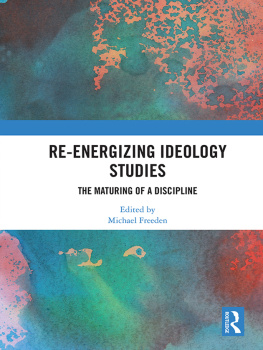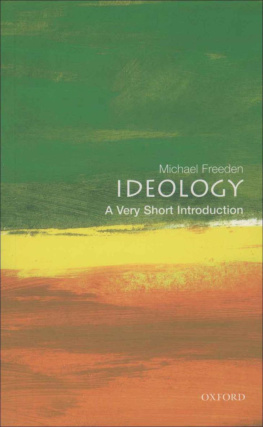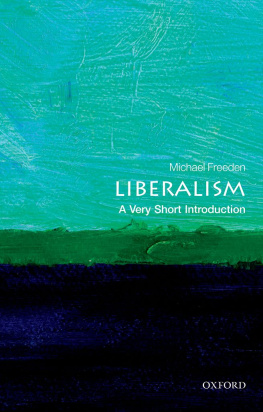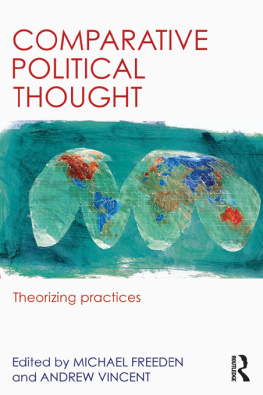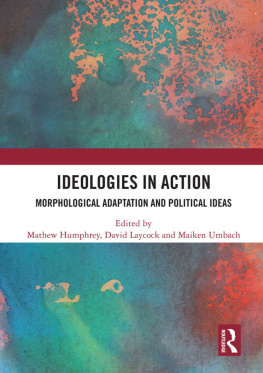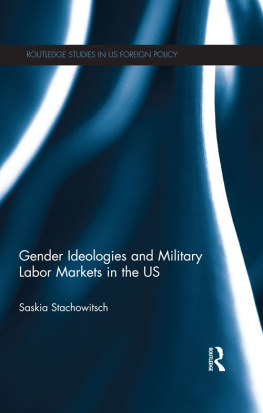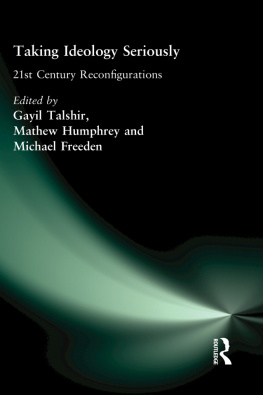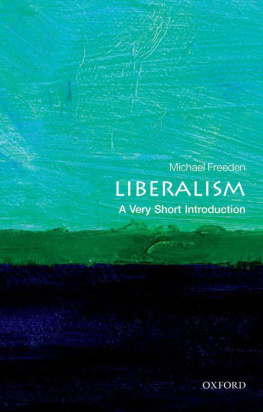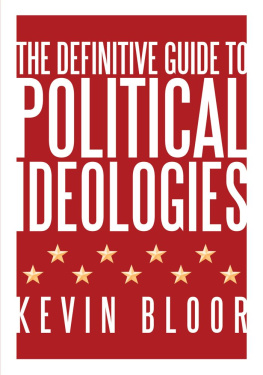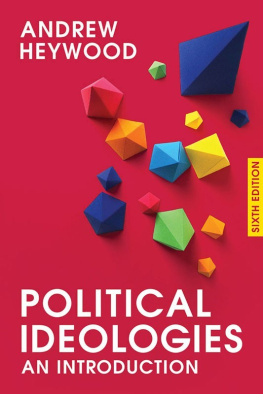THE OXFORD HANDBOOK OF
POLITICAL IDEOLOGIES
THE OXFORD HANDBOOK OF

POLITICAL IDEOLOGIES

Edited by
MICHAEL FREEDEN, LYMAN TOWER SARGENT
and
MARC STEARS


Great Clarendon Street, Oxford, OX2 6DP,
United Kingdom
Oxford University Press is a department of the University of Oxford.
It furthers the Universitys objective of excellence in research, scholarship,
and education by publishing worldwide. Oxford is a registered trade mark of
Oxford University Press in the UK and in certain other countries
Oxford University Press 2013
The moral rights of the authors have been asserted
First Edition published in 2013
Impression: 1
All rights reserved. No part of this publication may be reproduced, stored in a retrieval system, or transmitted, in any form or by any means, without the prior permission in writing of Oxford University Press, or as expressly permitted by law, by licence or under terms agreed with the appropriate reprographics rights organization. Enquiries concerning reproduction outside the scope of the above should be sent to the Rights Department, Oxford University Press, at the address above
You must not circulate this work in any other form
and you must impose this same condition on any acquirer
Published in the United States of America by Oxford University Press
198 Madison Avenue, New York, NY 10016, United States of America
British Library Cataloguing in Publication Data
Data available
Library of Congress Control Number: 2013938773
ISBN 9780199585977
Printed and bound in Great Britain by
CPI Group (UK) Ltd, Croydon, CR0 4YY
Links to third party websites are provided by Oxford in good faith and
for information only. Oxford disclaims any responsibility for the materials
contained in any third party website referenced in this work.
PREFACE
Over the past twenty years or so, the study of ideology as a political phenomenon has thickened and broadened, and the integration of ideology studies into the domains of political science and political theory in particular has made immense strides. The investigation of ideology has come out of the shadows of the Marxist traditionthough of course that tradition still exerts considerable influence. Ideology studies have begun to shed the pejorative connotations of the totalitarian legacies with which they have been burdened. They have also had to overcome being malignedalmost since the term was coinedas abstract, dogmatic, doctrinaire and apolitical, remote from the concrete world of praxis. Within the discipline of political studies or political science, ideology still leads a somewhat fragmented life, mirroring the regrettable distance that obtains between comparative politics and the more ethical and philosophical confines of political theory. Thus, the empirical exploration of attitudes and the inquiry into psychological explanations of ideational variations have developed in isolation from cultural and anthropological findings that are relevant to ideologies. Those in turn have flourished in separation from the critical basis of discourse analysis or from post-Marxist examination of ideology as articulating and fixing social and individual identities.
The publication of a handbook on political ideologies represents a milestone in the evolution of this branch of knowledge. All recent trends in its study would agree that ideologies are, have been and will be very much with usindeed as long as human beings remain political creatures, which they always will. Those trends complement each other in important ways that attest to the centrality of ideologies as a product of social activity and an indispensable feature of the political (and for the purposes of this volume ideologies and political ideologies are used interchangeably). No longer can the disparaging remarks of some philosophers or some politicians, to the effect that ideologies are inferior kinds of thinking or distractions from the real world, be taken seriously. Rather, they are at the heart of concrete political thinking as practised across the globe in myriad forms. As such ideologies require close consideration irrespective of their substantive meritswhich can be rich and positive as well as destructive or indifferent. No general understanding of the political can be fashioned without factoring in the role of ideologies. No academic course of political studies and no political activist can expect to attain professional and practical competence in their endeavours, unless the role of ideologiesas action oriented ideas concerning human communities seeking to achieve public influence and controlis appreciated.
The diversity of ideology studies is attested to by a mixture of the range of theories that illuminate the field, combined with the mutating complexity of concrete ideologies and their segmentation. In the thirty-five chapters that follow we cannot do justice to all, but we believe that an adequate cross-sample both of theories of ideology and of particular instances of ideological thinking has been assembled, and one that we hope will encourage further thought, research, and informed practice.
The Handbook has been divided into three parts. The first part reflects some of the latest thinking about the development of ideology on an historical dimension, from the standpoints of conceptual history, Marx studies, social science theory and history, and leading schools of continental philosophy. The second part includes some of the latest approaches to, and theories of, ideology, all of which are sympathetic in their own ways to its exploration and close investigation, even when judiciously critical of its social impact. This part contains many of the more salient contemporary accounts of ideology as a set of political-thought practices. The third part focuses on the leading ideological families and traditions, as well as on some of its cultural and geographical manifestations, incorporating both historical and contemporary perspectives. Ideologies obviously mutate, gently or radically, smoothly or through ruptures, and their study evolves as well. Even their very existence is questioned from time to time, though were that a view held by the authors of the chapters that follow, this volume could not have been written. If this Handbook throws down the gauntlet to those who have yet to treat the study of ideologies with respect, it is first and foremost intended to provide a firm basis for all those who want to learn about ideologies, who find them to be exciting as well as occasionally disturbing products of the human mind, and who desire to take our understanding of ideologies in yet newer directions.
We would like to express our profound thanks to the contributors who entered into the spirit of the enterprise and produced essays that reflect the coming of age of a scholarly discipline. And special thanks are due to Dominic Byatt as the guiding spirit and wise counsel who accompanied this project.
Michael Freeden, Lyman Tower Sargent, and Marc Stears.
August 2012
CONTENTS
BO STRTH
DAVID LEOPOLD
Next page

